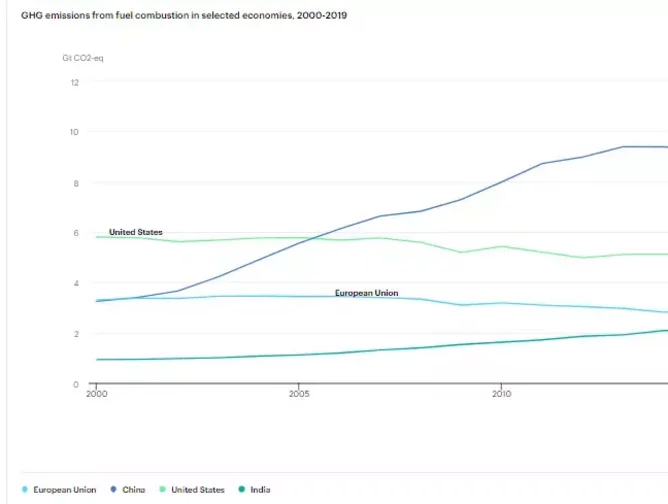Global CO2 emissions drop 5.8% in 2020 due to pandemic

There was an unprecedented 5.8% decline in global CO2 emissions as the COVID-19 pandemic slashed energy demand, according to IEA data.
Global GHG emissions from fuel combustion remained relatively flat at 34.2 GtCO2eq in 2019 after peaking in 2018, at 34.3Gt.
Emissions in the US decreased by 3.4% in 2019, resuming the three-year decline that was briefly broken in 2018, while in India they barely decreased in 2019 after steady increases for many years - and the EU continued on its downward trend, with a 4.9% year-on-year decrease. But emissions in China kept increasing with a year-on-year growth of 1.7% in 2019 - in line with its rising emissions over the last 20 years.

Provisional data for 2020 points to declines in many leading countries. The US and Germany led the way, with year-on-year declines of 9.7% and 9.1% respectively. GHG emissions also fell in Brazil (-6.2%), the Russian Federation (-5.2%) and Japan (-3%).
CO2 emissions from fuel combustion are affected by a range of drivers, including population growth, GDP and energy supply. CO2 emissions from electricity generation, around 40% of the total, are determined by electricity output, generation efficiency, and the share and carbon intensity of fossil fuel generation.
Emissions in the transport sector increased to account for 27% of the global emissions in 2019, while buildings related emissions slightly decreased to represent 25% of global emissions.
Rapid actions needed now urges IPCC report
While the reversals were welcome, the challenges for public and private sectors will be keeping emissions in check while kick-starting economies after the pandemic - especially as the Intergovernmental Panel on Climate Change (IPCC) underlined the scale of the challenges in a hard-hitting report released yesterday.
Strong, rapid and sustained reductions in CO2, methane and other greenhouse gas emissions are necessary to reduce global warming, according to the Sixth Assessment Report.
Delivering comprehensive research from 234 authors across 65 countries, the IPCC reiterated the importance of immediate actions to reverse climate change, as extreme weather events are increasing in their regularity and intensity. CO2 concentration is at its highest in two million years, the report found.
Across all key industries, the race is on to develop alternative energy sources and sustainable products amid ongoing digital transformation.
The world's first 120-ton AC electrical drive dump truck for mining entered service at the Nanlutian mine in Huuliin Gol, Inner Mongolia autonomous region, on July 22.
DHL recently placed an order for 12 fully electric Alice eCargo planes from Eviation and Hyzon Motors' hydrogen fuel cell-powered truck will hit the road soon in California in its first customer trial in the US.
Read all the latest industry developments in our Hydrogen feature in the September magazine.






